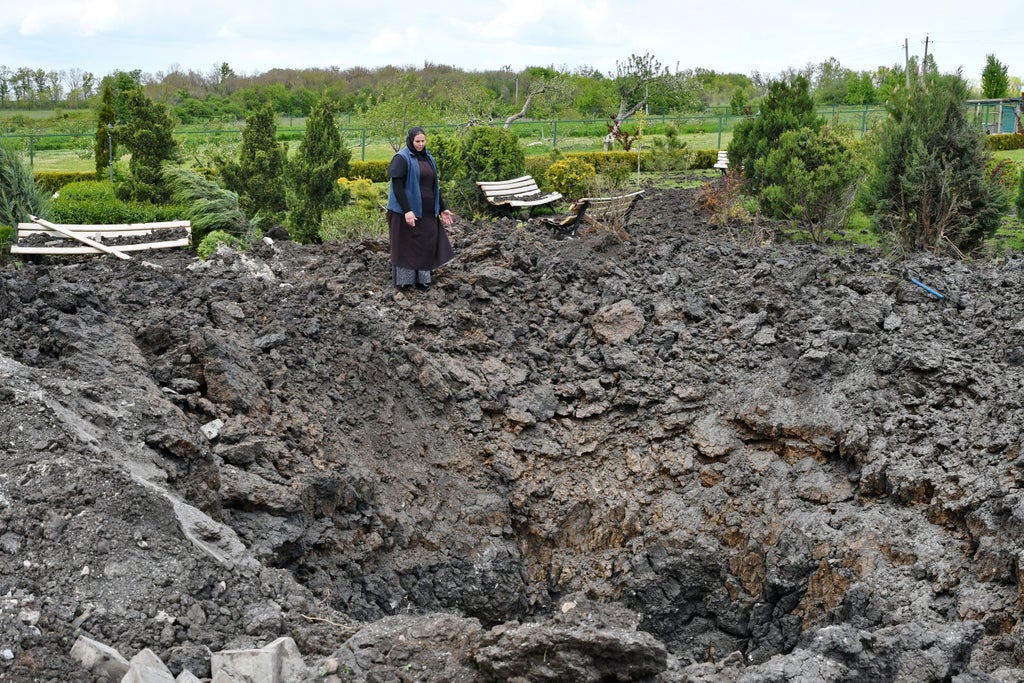
Leaders from both parties tried clearing the way for Senate passage Thursday of an additional $40 billion for Ukraine and its allies, a package of military and economic aid that underscores U.S. determination to reinforce its role in countering the Russian invasion.
Senate Minority Leader Mitch McConnell, R-Ky., called on Republicans and Democrats " to help us pass this urgent funding bill today.” The only apparent stumbling blocks to quick approval seemed to be the demands of some Republicans for votes on proposals including having an inspector general scrutinize the new spending.
Passage by a strong bipartisan margin seemed certain soon. If the bill is not amended, that vote would mean final congressional approval for a measure that Democrats and most Republicans want to speed to President Joe Biden so weapons and supplies can continue flowing to the outnumbered Ukrainians.
“Republicans shouldn’t block this bill," said Senate Majority Leader Chuck Schumer, D-N.Y. “There is no reason, no reason whatever not to get Ukraine funding approved fast."
It was unclear how GOP lawmakers' demands for votes would be addressed, but they are often resolved at the last moment. Sen. Rand Paul, R-Ky., who is pressing for the inspector general role, told reporters, “I’m not allowing a speedy passage of the bill without having something fiscally responsible in the bill.”
The House voted 368-57 on Tuesday to approve the measure. All Democrats and most Republicans backed it, though every “no” vote came from the GOP.
The bipartisan backing for Ukraine has been partly driven by accounts of Russian atrocities against Ukrainian civilians that have been impossible to ignore. It also reflects strategic concerns about letting Russian President Vladimir Putin seize European territory unanswered as his assault on his neighbor to the west grinds into its 12th week.
“Helping Ukraine is not an instance of mere philanthropy," McConnell said. "It bears directly on America’s national security and vital interests that Russia’s naked aggression not succeed and carries significant costs.”
Biden administration officials have said they expect the latest aid measure to suffice through September. But with Ukraine taking heavy military and civilian losses and no sign of when the fighting might end, Congress will ultimately face decisions about how much more aid to provide at a time of huge U.S. budget deficits and a risk of recession that could demand added spending at home.
The latest bill, when added to the $13.6 billion Congress approved in March, would push American aid to the region well above $50 billion. For perspective, that would total $6 billion more than the U.S. spent on military and economic aid around the world in 2019, according to the nonpartisan Congressional Research Service.
The push toward passage came as Russia continued blasting Ukrainian forces and cities in southern and eastern portions of the country. Reflecting international concerns prompted by the assault, Finland's leaders announced their support for joining NATO and Sweden seemed not far behind.
Biden asked Congress for $33 billion two weeks ago. It didn't take lawmakers long to add $3.4 billion to his requests for both military and humanitarian programs.
The measure includes $6 billion for Ukraine for intelligence, equipment and training for its forces, plus $4 billion to help Kyiv and NATO allies build up their militaries.
There's $8.7 billion for the Pentagon to rebuild stocks of weapons it has shipped to Ukraine and $3.9 billion for U.S. troops in the region.
The measure also includes $8.8 billion to keep the Kyiv government functioning, more than $5 billion to provide food to countries around the world that rely on Ukrainian crops devastated by the fighting and $900 million to teach English and provide other services to Ukrainian refugees who have moved to the United States.
The biggest hurdle to rapid approval of the assistance was cleared this week when Biden and Democrats dropped their demand to include billions more in the measure to bolster U.S. efforts to counter the coronavirus pandemic.
Republicans want separate COVID-19 legislation to be a battleground for an election-season fight over immigration that divides Democrats.
The aid bill lacks Biden proposals to help qualifying Afghan refugees to remain permanently in the U.S., and $500 million to pay U.S. farmers to grow more crops to compensate for Ukraine’s curtailed food production. Also gone are Biden requests to help Russian scientists emigrate to the U.S., and to let the Justice Department transfer money to Ukraine that the U.S. has acquired by seizing Russian oligarch’s assets.







